WHAT IS ATLANTIS?: A QUEST FOR THE ROOTS OF PLATO'S FAMOUS TALE
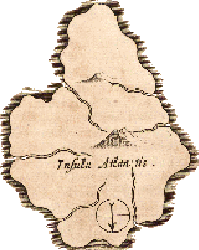
What is Atlantis? A browse through the wonderful Atlantipedia reveals a bewildering array of ideas suggestive that Atlantis has become all things to all men (apologies for the gendered language there, folks!). There are many theories from across the years as to what Atlantis "actually" was, but, by definition, most have as much claim to represent the facts as J.R.R. Tolkien's sunken western land of Númenor.
Therefore, in order to cut to the chase, it most certainly behooves us to head to the source. That source is a man called Plato, a philosopher (please note: *not* a historian) who dwelt in Athens during the Classical era.
PLATO'S ATLANTIS

The story of Plato's Atlantis begins in the years around 370 BC, during which time Plato was writing the last nine of the ten books of his Republic, a major dialogue in which he depicts his mentor Socrates explaining his constitution for the ideal city to Plato's brothers Glaucon and Adeimantus.
This was followed about a decade later by the writing of the Timaeus and Critias, in which Socrates, desiring to see his perfect city in a state of war [Tim. 19c], proposes a thought experiment.
Socrates' wish to see his city in action is Critias' command. A suitably grandiose nemesis for this perfect city - which Critias fashions from a very early Athens, from a time beyond the reach of contemporary Greek memory - is described: this enemy is the civilisation which has become universally known as Atlantis, an island "larger than Libya and Asia together" located in the Atlantic [Tim. 24e; Crit. 108e] under the command of the corrupted descendants of the eponymous Atlas (not to be confused with the better-known figure of that name), the eldest of ten sons born to Poseidon on the island.
"Its subject," replied Critias, "was a very great exploit, worthy indeed to be accounted the most notable of all exploits, which was performed by this city, although the record of it has not endured until now owing to lapse of time and the destruction of those who wrought it." [Tim. 21d].
Critias begins by stating that, remarkably, his knowledge of these events has been passed down within his family from the time of Solon (an important Athenian lawgiver and statesman who flourished in the period from about 600 to 550 BC), knowledge which Solon in turn received during a visit to Egypt from priests in the temple at Saïs. Thus, the story is given an impeccable pedigree.
The island itself, as well as the sea in which it was located, apparently bear the name of this Atlas, rather than that of his namesake the son of Iapetus, as was generally believed. It is only thanks to the Egyptians' good fortune to be insulated from the recurrent natural disasters which overthrow the world order that they are able to preserve the memory of these incredibly distant (9,000 years - a long time) days.
But how does Plato - or, perhaps more accurately, his character Critias - describe Atlantis?
FIND OUT FOR YOURSELF - READ THE BLOODY DIALOGUES!WAS ATLANTIS REAL?
Exactly as described by Plato? That's a no from me.
The notion of an island which is perhaps envisaged as almost on the scale of the present-day Russian Federation with mountains which rose higher than any known to the Greeks of Plato's time [Crit. 118b] being swallowed up by the ocean in a matter of hours, with only an impassable shoal standing sentinel to its once having existed does strain credulity somewhat.
It is probably more prudent to consider these as exaggerations - such as were common in ancient literature - and try to seek a more prosaic answer. There is no evidence that certain facets of Atlantis were not based upon factual events and places, which Plato drew upon in designing the myth of Atlantis.
One important fact to note is that there seems to be no scientific possibility that a large landmass existed where Plato places the island which could contain even the central plain of Atlantis during the timeframe in which the dialogue is set. A number of theories posit a Mediterranean-based Atlantis, but this doesn't work, as Plato specifically places the island outside the Mediterranean.
ATLANTIS IN THE MENEXENUS?
Another objection one could raise is the fact that the Atlantis story appears in a dialogue produced late in Plato's career. Given that it was passed on from Solon through Dropides to the latter's descendants - a group which includes Plato - why not mention it earlier, particularly in the Menexenus, a much earlier dialogue in which Socrates is made to extol the military virtues of the Athenians.
There is, however, some ambiguity in the Menexenus [239bc], which mentions a variety of foes faced down by Athens in ancient times: -
Are the "still earlier invaders" the forces from the island of Atlas?
One thing which gives us cause to doubt is the subsequent statement that "already their valor has been adequately celebrated in song by poets who have made it known throughout the world." This is in sharp contrast to the statement in the Timaeus [20e], which holds that: "the record of [the war between Athens and Atlantis] had perished through time and the destruction of [Athens'] inhabitants." Additionally, where Lamb - the translator cited above - includes the "still earlier" detail, Jowett does not. Nevertheless, it must be noted that Socrates, the speaker in this passage, lived after Solon, which does open the door somewhat to Solon having brought knowledge of an earlier feat from Egypt. Some initial thoughts as to what this may have been are articulated elsewhere.
WHAT ARE PLATO'S MAIN SOURCES FOR THE MYTH OF ATLANTIS?
THE PERSIANS IN THE MENEXENUS
The Menexenus continues [239d-240a]: -
The dialogue continues, extolling the valour of the Athenians who stayed the hands of the mighty Darius and destroyed the myth of Persian invincibility (ironically, the dialogue makes grandiose claims about Persian sea power [241b] - claims which would doubtless come as a surprise to readers of Herodotus [see 7.89-96 for the make up of the Persian fleet at Salamis] - as well as the King of Kings himself.
Regardless of whether or not one sees a reference to Atlantis in the Menexenus, it seems pretty clear that the description of the might of the Persians and the exalted role of Athens in countering them in the dialogue are reflected in the Atlantis myth.
Now, however, me must travel westwards, to Sicily.
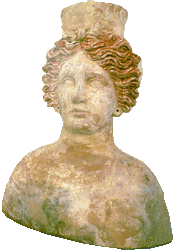
CARTHAGE AND SICILY
In my opinion, perhaps the most viable source for Atlantis lies in sailors' tales gathered from the Greeks' Carthaginian neighbours.
Plato spent time in Sicily - the site of colonial enterprises of both Greeks and the Carthaginians' Phoenician forebears - on a number of occasions. During the first of these, dating to around 389-387 BC, he struck up what would become an abiding relationship with Dion, a Greek from Syracuse with a keen interest in philosophy, who served as an adviser to the tyrant Dionysius the Elder, and who was remembered for his close relations with the Carthaginians.
Plato returned to Syracuse in around 367 at Dion's invitation, and the pair collaborated in an abortive attempt to mould Dionysius' son and namesake into Plato's ideal "philosopher king," a concept he developed in his Republic as the ruling class of his ideal city.
It is possible that, whilst sojourning on the island, Plato became party to whispers about Carthaginian discoveries beyond the "Pillars of Heracles" (the Strait of Gibraltar as we know it today), discoveries which were certainly known, however poorly, to the Greeks: a work ascribed to Plato's one-time student Aristotle, De Mirabilibus Auscultatonibus, gives the following brief notice [84]: -
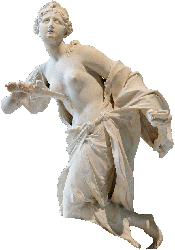
The source of these rumours may well be the exploratory mission of two Carthaginian brothers, Hanno and Himilco, the latter of whom is said to have established contact with a people called Hierni who dwelt on what the Greek translators render "Holy Island," (cf. Crit. 115b) which is almost certainly Ireland.
Himilco's journey, given the probability that it was for the purposes of opening up new trade routes, may also be behind the whispered rumours of the Cassiterides or Tin Islands (whose inhabitants, like the Athenian archons, are reputed to dress in dark clothes) and, ultimately, a tradition ascribed by Proclus Lycaeus to Marcellus regarding Atlantic islands, which shows the influence of both Plato and Himilco's debtors.
Interestingly, Himilco is said to have encountered numerous problems on his journey, which included areas in which the ocean was so shallow as to prevent navigation, a "fact" which became something of a mainstay of Greek descriptions in and around Plato's time.
Thus we have the island and the shoal.
The name of the island is specifically derived from that of Plato's Atlas, whose namesake was also regarded early in the Greek age of discovery as giving his name to the vast mountain range in north-western Africa. Furthermore, Herodotus attests to the existence of people groups bearing the names Atlantes and Atarantians in the region. A possible Egyptian connection may be found in the records of Thutmosis III, whose Hymn of Victory includes a mention of the wṯntyw in association with the Tehenu, a Libyan group.
HELICE AND BURA
As for the ultimate destruction of the island, that is perhaps based upon events closer to home. The cities of Helice and Bura in Achaea were inundated in 373 BC, as a result of an earthquake, shortly before Plato's Atlantis dialogues were written. The city was destroyed by another earthquake and tsunami, and portents included what appear to be earthquake lights. Strabo writes that this was due to offences against the Ionians associated with the cult of Heliconian Poseidon, whose worship included the use of bulls [8.7.2]: -
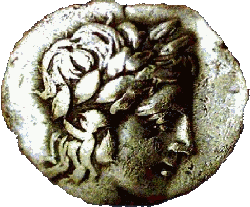
Slobodan Dušanić remarks that Plato too, as a religious man, would have understood these events as being caused by the wrath of the gods. Simultaneous with the inundation of Helice and Bura, an earthquake struck the sanctuary of Apollo at Delphi, the most important of the Greek oracular shrines, which was to be the focal point for the Third Sacred War, which was brewing in the 350s.
The significance of the destruction of Helice would, thus, not have been lost for Plato, who very likely developed his story of Athens and Atlantis (in part at least) as a warning to his compatriots against waging this war.
It should be noted that Strabo does not mention the precise location of the bull's sacrifice, which is above a stela of orichalcum in the Critias [119ce]. Nor is the sacrifice of a bull especially diagnostic: such practices were widespread in the ancient world. It is, however, tempting to associate this sacrifice to Heliconian Poseidon with the Atlantean princes' troth in the temple complex described by Plato.
Furthermore, Strabo cites Eratosthenes, who indicated that "there was a bronze Poseidon in the strait, standing erect, holding a hippocampus in his hand" associated with the submarine ruins of Helice. A statue of Poseidon also features in the Critias [116de], albeit in gold and standing in a chariot with no mention of a hippocampus, instead naming winged horses harnessed to his chariot.
Plato was the author of a number of "myths" in addition to the Atlantis tale, basing much of the material in them on pre-existing mythology and literature, whilst adding his own twists to suit his philosophical goals. It is likely that Atlantis echoes far-flung locales known in earlier texts. Prime examples - to this writer's mind - would be the various places visited by the hero Odysseus in the Homeric Odyssey, especially Scheria and the land of the Cyclopes (home to clans descended from Poseidon), Ogygia and the mysterious land of Syrie, homeland of Odysseus' serving-man Eumaeus, found in the direction of the turning-point of the sun.
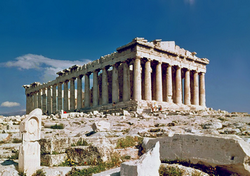
WHY DESTROY ATHENS ALONG WITH ATLANTIS?
One of the most mystifying elements of the myth to modern readers is the destruction of the Athenian forces along with their Atlantean counterparts. While, in the case of the former, this is most commonly explained as the result of their growing wickedness coupled with a signal failure to mend their ways, the Athenians appear to be blameless.
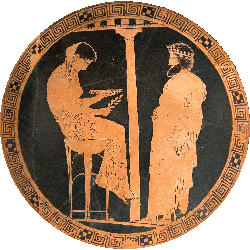
Slobodan Dušanić reminds the reader that similarly innocent Delphi was damaged by the earthquake which led to the destruction of the impious Helice and Bura, an event whose significance, Dušanić argues, was not lost on Plato, and is a likely prompt for his notion of Atlantis.
It is also germane to note Susan O. Shapiro's reappraisal of Herodotus' treatment of Solon, wherein she argues that the myth of Tellus of Athens [1.30-31], which Herodotus has Solon relate to Croesus the Lydian, represents Herodotus' own opinions of the good fortune of meeting one's end at the time of one's akme. Tellus, according to Herodotus, lived a virtuous life, becoming prosperous, living to see his children grow, and gaining glory in his death in battle at Eleusis against Athens' neighbours.
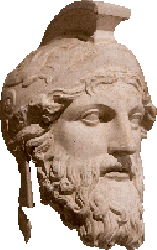
Shapiro contrasts the tale of Tellus with what Herodotus recounts about a variety of other figures, including Militiades, the victor at Marathon [6.132-136]. Unlike Tellus, Miltiades survived the battle and, his stock having understandably risen, he undertakes a deceptive and hybristic campaign against the inhabitants of Paros to avenge a personal grudge and seek plunder. He ends up mortally wounded after committing an act of sacrilege and is subsequently fined for his iniquity, a fine which is eventually paid by his son Cimon after Miltiades' demise.
Thus, as well as providing a critique of the democratic system which then prevailed at Athens - in which a popular figure can pursue his own ends unhindered by checks and balances due to wide support - a comparison of Tellus and Miltiades shows a contrast between Tellus - who, in Plato, represents the Ur-Athenians - who dies at the high point of his career, and the prideful Miltiades - who, like the Atlanteans, was rightly revered for his previous glorious deeds and achievements, only to overreach himself and suffer an ignominious end.
The demise of the ancient Athenian guardians, at the time of their greatest victory in vanquishing the might of Atlantis, is thus the ideal death in Herodotus' thought, voiced by Solon, a notion followed also by Plato.
IS THERE AN ENDING TO THE CRITIAS?
An alleged complete finale to the Critias appeared in 2004, which, as it has absolutely nothing whatsoever to do with the dialogue as we have it, was nothing more than a blatant fraud, and reads more like a combination of New Age hogwash and bad science-fiction. As to the provenance of the text, the source, writing for the defunct website Pandora's Files, says this: "I cannot verify of course the originality of the text, but it is certain that it was saved by some Basques who gave the text to a Greek writer named A. Keramidas, that will publish his book in Germany." Since then, I can find no evidence for the publication of Keramidas' book and, on the whole, this particular (brown) nugget fails the sniff test: it's not gold, people.
Another hoax, attributed to a Eumalos of Cyrene, appeared in the 19th century, purporting to summarise the history of Atlantis, conveniently located in the region of modern Malta, an identification seized upon by researchers who imagine Atlantis was in and around this archipelago. The "Eumalos" in this instance was a nom de plume of the Marquis de Fortia d’Urban, writing in 1827-1828.


Similarly, a work allegedly by one Diodorus of Alexandria (whoe'er the deuce *he* was supposed to be) based on the account of his namesake Diodorus Siculus of the war between the Atlanteans and Amazons, which detailed the career of an Atlantean by the name of Azor, who was taken captive by the Amazons, was at one time doing the rounds on the Internet. However, the chances of this having anything to do with Diodorus is nonexistent: it is nothing more than a modern soft porn fanfiction with a decided penchant for a spot of BDSM.
On a more elegant note, George Sarantitis, a Greek who claims to have developed a uniquely accurate translation of the texts, suggests that the Critias was "unfinished" by design, and that Plato intended the reader to be directed to Zeus' statement in the Odyssey [1.32-34]: -
That seems an apt place at which to draw this phase of the investigation to an end.
